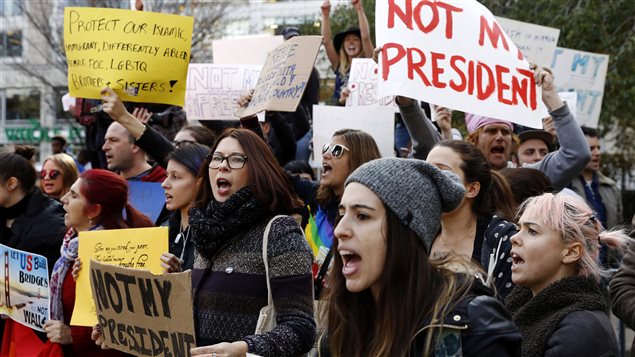Ever since Donald Trump’s stunning victory in the U.S. presidential race on Tuesday night, Mitchell Goldberg and his colleagues have been fielding calls from worried Americans who want to move to Canada.
“Just yesterday an American citizen family, who happen to be of Iraqi origin and therefore Muslim, they called us up in tears,” said Goldberg, a Montreal-based immigration lawyer and president of the Canadian Association of Refugee Lawyers.
“They had previously contacted our office because of the rhetoric they heard during the election campaign just to make some preliminary enquiries and then they heard the results, and they were just devastated and they feel very, very vulnerable.”
(click to listen the full interview with Mitchell Goldberg)
Audio PlayerCanada offers a myriad of possibilities for Americans who want to move north of the 49th parallel: skilled immigrants, provincial nominee programs and Canadian experience class, as well as spousal sponsorships (for those who are married or in a common-law relationship with a Canadian).
But none of them are quick — all require some sort of relevant work experience and job offers from Canadian employers, or a lengthy sponsorship process.
Big hurdles to overcome
“It completely depends on their situation, their education, whether they have family members in Canada, what field of work they are in,” Goldberg said. “There is no one size fits all.”
There are a number of hurdles to moving to Canada. The federal government has set a limit for accepting 300,000 new permanent residents in 2017. Of that number 40,000 will be refugees and 80,000 will be family members of existing Canadians.
The remaining 180,000 permanent resident visas will be reserved for mostly skilled workers, many of whom have already applied to enter Canada and are awaiting a years-long paperwork process.
For those looking for a temporary break from four years of Trump governance, there are other options as foreign students and temporary foreign workers on work permits.
No chance of political asylum for now
But one immigration option that would likely be completely closed to Americans in the foreseeable future is Canada’s refugee system, Goldberg said.
“Somebody will have to show that they are being singled out, whether it’s something like spousal abuse, or because of their political opinion, and not only they are being singled out and harassed but that they can’t go to the police, they can’t go to the courts,” Goldberg said. “Of course, the United States like Canada has a constitution, they have a Bill of Rights. Today a Canadian tribunal would rule that it is far too speculative to decide.”








For reasons beyond our control, and for an undetermined period of time, our comment section is now closed. However, our social networks remain open to your contributions.